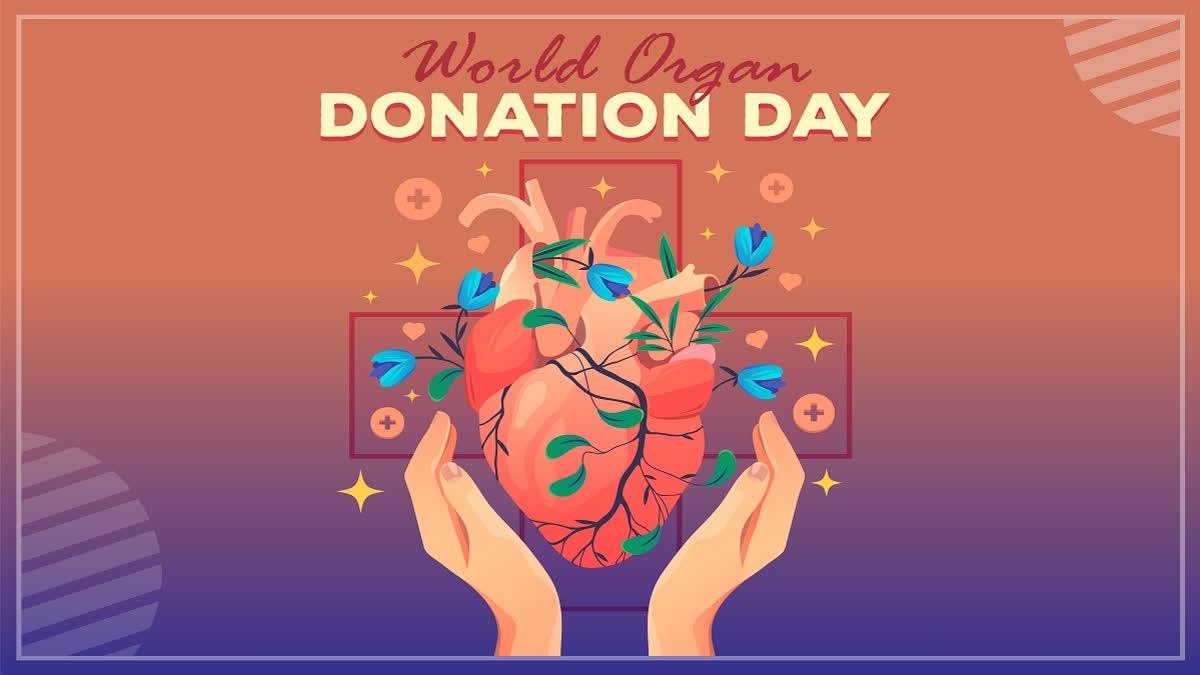Hyderabad: The World Organ Donation Day is celebrated on August 13 every year by the people, government organisations and other related professions to motivate normal human beings to pledge to donate organs after death, and to spread awareness about the importance of organ donation as well as to understand the value of organ donation in the life of an individual.
Due to the lack of awareness, there are myths and fears in peoples’ mind about organ donation. This year, 2024, the slogan for World Organ Donation Day is 'Be the Reason for Someone's Smile Today!'.
Organs That Can Be Donated
Organ transplantation and donation both can be successfully done due to the development of immuno-suppressive drugs which can increase the survival rate of organ recipients. The organs which can be successfully transplanted are the kidney, Lungs, Heart, Eye, Liver, Pancreas, Cornea, Small Intestine, Skin tissues, Bone tissues, Heart valves, Veins
Facts about Organ Donation
- Anybody can be an organ donor irrespective of their age, caste, religion, community etc
- There is no defined age for donating organs. The decision to donate organs is based on strict medical criteria, not age
- Tissues such as the cornea, heart valves, skin, and bone can be donated in case of natural death but vital organs such as heart, liver, kidneys, intestines, lungs, and pancreas can be donated only in the case of 'brain death'
- Organs such as the heart, pancreas, liver, kidneys and lungs can be transplanted to those recipients whose organs are failing because it allows many recipients to return to a normal lifestyle
- Anyone younger than age 18 needs to have the agreement of a parent or guardian to be a donor
- Having a serious condition like actively spreading cancer, HIV, diabetes, kidney disease, or heart disease can prevent you from donating as a living donor
- In India, you can also donate your whole body after death for medical research and education
- Transplantation of Human Organs Act, was passed in 1994 and amended in 2011, and the rules were notified in 2014 for the regulation of removal, storage and transplantation of human organs and for the prevention of commercial dealings in human organs
What Is Organ Donation?
Organ donation is the process of donating organs or biological tissue to a living recipient, who is in need of a transplant through medical treatments.
Can a Donor Donate Organs After a Cardiac Death?
No. In case of cardiac arrest all organs and tissues in the body suffer from lack of oxygen and die. People who have a cardiac death cannot be organ donors however they can donate tissues after death.
When Are Organs Removed After Death?
Organs must be removed as soon as possible after the determination of brain death, while circulation is being maintained artificially. Tissues may be removed within 12 to 24 hours.
What is Brain Death? (Cadaver Transplant)
All areas of brain are damaged and no longer function due to which a person cannot sustain his/her own life, but vital body functions may be maintained by an artificial support system. People who experience brain death also donate tissues.
Which Organs Can Be Donated After Brain Death?
Vital Organs like heart, liver, kidneys, intestines, lungs, and pancreas can be donated only in case of ‘brain death’. However other tissues like corneas, heart valves, skin, bones etc. can be donated only in case of natural death
Is Organ Donation Safe?
Yes. All potential donors are screened for ruling out transmitted diseases such as HIV and Hepatitis.
Can I donate if I have a medical condition?
The medical condition will be assessed at the time of organ donation to see if you are a fit candidate for the same.
Procedure to be an Organ Donor
Pledging your organs is a simple procedure. Just fill out the online pledge form and they will send you a donor card with your unique government registration number. All pledges are registered with the National Organ & Tissue Transplant Organisation (NOTTO). Registering as an Organ donor is merely an expression of your intent to be an Organ donor.
According to Indian law, it is your next of kin who will decide whether to donate your organs or not upon death. Even if you have pledged your organs, no donation will happen unless the next of kin gives their consent. Therefore, when you pledge to be an organ donor, it’s very important that you discuss your wish to donate with your family.
Let's Save lives
One organ donor can save more than nine lives in his life by donating his/her properly functioning organs. Let us now take a pledge to donate our organs and spread awareness about it as well. Following are the top NGO’s and organisations of the country involved in organ donation:
- Mohan Foundation
- Gift Your Organ Foundation
- Shatayu
- Gift A Life
- Dadhichi Mission from Central India - having centers in Delhi, Modinagar, Gurgaon, Mumbai, Hyderabad, Bhopal, and Bengaluru
- You can also Register to be an organ donor at: www.OrganDonationDay.in
- Toll-free Helpline Number- 18001203648
- To show your support, you can give a missed call at: 8080055555



